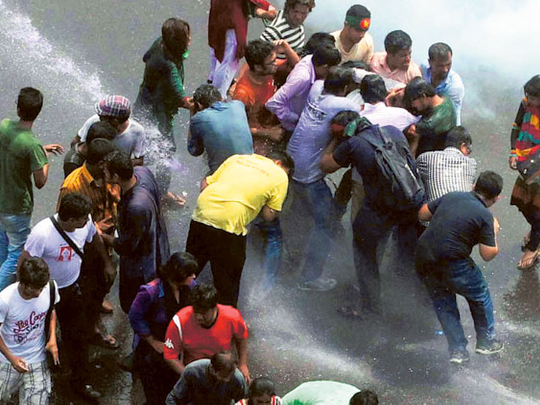
Dhaka: Bangladesh’s highest court on Wednesday commuted the death sentence on a top preacher, triggering angry protests by both his militant supporters and secular opponents and clashes with police.
In a surprise ruling, the Supreme Court said 74-year-old Delwar Hussain Sayedee should spend “the rest of his natural life” in jail for crimes during the 1971 liberation war with Pakistan.
Sayedee’s death penalty passed last year by a war-crimes tribunal triggered the deadliest political violence in the country’s history, and thousands of police were deployed before Wednesday’s ruling.
“We had expected that the court would uphold his death sentence,” Attorney General Mahbubey Alam told AFP, adding that he was unhappy with the verdict.
Alam said Sayedee was a war criminal and “torturer of women” during the nine-month conflict, which led to the creation of Bangladesh from former East Pakistan.
Violence erupted between police and hundreds of angry secular demonstrators who converged on Dhaka University after Wednesday’s verdict to protest at perceived leniency.
Armed with batons, police fired tear gas and a water cannon to try to disperse the demonstrators who shouted slogans and threw stones at officers.
“This is part of negotiations between the government and the Jamaat-e-Islami party,” said protest leader Imran Sarker, whom police said was among seven people injured.
Secular activists have long called for the banning of Jamaat, the country’s largest militant party of which Sayedee was the vice president, accusing its leaders of atrocities committed during the war.
Jamaat, blamed for last year’s violence, called a two-day nationwide strike starting from Thursday. It said Sayedee was prosecuted on “false and fabricated” charges.
Its activists clashed with police in the northwestern city of Rajshahi, where officers fired rubber bullets and tear gas, TV footage showed.
Sayedee shot to prominence in the 1980s after he started preaching in some of the Muslim-majority nation’s top mosques. In his heyday he would draw hundreds of thousands to his sessions and CDs of his speeches were top sellers.
Many of his supporters even claimed to have seen his face on the moon in a mark of his “saintly” status.
His conviction in February 2013 on eight charges of murder, rape and persecution of Hindus sparked riots by tens of thousands of supporters nationwide, leaving more than 100 people dead.
Sayedee’s lawyer said he was dissatisfied with the latest ruling, adding his client should have been acquitted on all charges.
“The evidence against him does not warrant conviction or sentencing even for a day,” lawyer Tajul Islam told AFP.
Sayedee is among about a dozen leaders to have been convicted by the much-criticised tribunal set up by the secular government to investigate crimes during the 1971 war.
Militants say its trials are more about settling scores than delivering justice.
The militants convicted so far were all accused of being leading members of pro-Pakistani militias who were behind the murder of thousands of people including some of Bangladesh’s top professors, writers, journalists and doctors.
Last December one of Sayedee’s top colleagues was hanged after the tribunal found him guilty of war crimes.
At the time of his conviction, Sayedee claimed the judgement was influenced by “atheists” and pro-government protesters who wanted to see him dead.
Rights groups say legal procedures at the tribunal fall short of international standards.
The government rejects the accusations, saying the trials are needed to heal the wounds of the war that it claims killed three million people.
Independent estimates put the number of deaths between 300,000 and 500,000.












